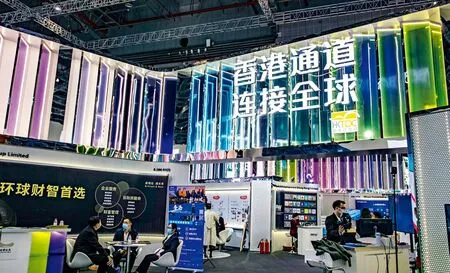NEW OPPORTUNITIES FOR HONG KONG-ASEAN TRADE
2022-07-20ByWuChongbo
By Wu Chongbo
Traditionally a window and bridge connecting the Chinese mainland to the world,Hong Kong has embraced even greater development since its return to China,while lifting China-ASEAN relations to a new high
Since its return to China in 1997,Hong Kong has been building closer economic and trade relations with ASEAN,a block geographically adjacent to it.Embracing the role of a“super connector”in China-ASEAN collaboration,Hong Kong has welcomed a steady increase in trade and investment cooperation with ASEAN countries.
According to data from the Census and Statistics Department of the Government of the Hong Kong Special Administrative Region,the trade value between Hong Kong and ASEAN reached US$132.55 billion in 2020,making it ASEAN’s sixth largest trading partner after the Chinese mainland,the United States,the European Union,Japan,and the ROK.ASEAN was Hong Kong’s second largest trading partner that year.
In 2014,Hong Kong’s direct investment in ASEAN exceeded US$10 billion for the first time,and it hit a record US$12.60 billion in 2018.The number decreased slightly in 2019 to US$11.31 billion.According to the Census and Statistics Department,as of June 2020,a total of 640 ASEAN companies maintained a business presence in Hong Kong,accounting for 7.1 percent of all foreign companies there.Among the 640 ASEAN enterprises,61 maintained regional headquarters there while 136 opened regional offices and 443 set up local offices in Hong Kong.
Hong Kong’s Role in Economic Cooperation
The first reason Hong Kong has seen such great development of economic relations with ASEAN is its role as an intermediary seeking to boost China-ASEAN economic relations.
In recent years,the Chinese mainland and ASEAN countries have both strengthened Hong Kong’s status as a critical link to each other’s market.Companies based in both regions have placed their Asian regional headquarters in Hong Kong to expand and manage operations.More companies from both the mainland and ASEAN are increasing their business presence in Hong Kong,reflecting investor confidence in Hong Kong’s business environment and the increased significance of the economic platform.
International companies have caused a great aggregation effect in Hong Kong,highlighting the region’s attractiveness as a springboard for foreign companies to enter the Chinese mainland market while enhancing Hong Kong’s influence on the ASEAN market and its capabilities in comprehensive management.
Hong Kong boasts industrial advantages because of its professional services that meet the requirements of ASEAN,making Hong Kong-ASEAN collaboration attractive and promsing.An international hub of finance,trade,and shipping businesses,Hong Kong facilitates China-ASEAN regional cooperation by serving as a foundational investment and finance platform,a transportation and logistics hub,a major depot for international trade,and a provider of professional services.
Second,Hong Kong has geographical advantages that could boost China-ASEAN economic and trade relations.
ASEAN countries are not only close neighbors of China but important partners in economic and trade cooperation.The bilateral economic relationship has undergone rapid development.In 1997,the total trade value between China and ASEAN countries was only US$25.16 billion,and the number skyrocketed to US$878.2 billion in 2021.China has been ASEAN’s largest trading partner for 13 consecutive years,and ASEAN became China’s top trading partner in 2020.
After its return to China in 1997,Hong Kong has enjoyed greater development as a window and bridge connecting the Chinese mainland to the world,which has boosted China-ASEAN relations.Hong Kong has been acting as a key driver of rapid development of economic and trade ties between China and Southeast Asia.

Organized by the Chinese General Chamber of Commerce (CGCC),the CGCC World Chinese Entrepreneurs Summit under the theme“Connecting Greater Bay Area,Serving Belt &Road”opened at the Hong Kong Convention and Exhibition Center on June 17,2021.(LI ZHIHUA)
The third reason is continued legal protection of ASEAN investors’interests in Hong Kong after its return to China.The central government has taken effective measures to protect and secure foreign investors’ legal interests in Hong Kong to guarantee a relatively free business environment for overseas investors like Southeast Asian businessmen.Hong Kong has managed to maintain its privileges as a paradise for foreign investment.
Fourth,Hong Kong has enhanced its function as an entrepot between mainland and Southeast Asian markets.For a long time,Singapore was the major intermediary country for Chinese products bound for Indonesia.Hong Kong’s merchandise transit speed was hampered by local customs’ delays,making shipping lines from Hong Kong to Singapore and then Jakarta more effective than direct links between Hong Kong and Jakarta.Even most locally produced Hong Kong goods had to go through Singapore before arriving in Indonesia.
After Hong Kong’s return,the central government introduced multiple measures to enhance Hong Kong’s function as a logistics and distribution hub.It increased local customs’efficiency,improved organizational service,and added airlines and shipping lines from Hong Kong to Jakarta and to other Indonesian cities enabling mainland products to reach Indonesia directly from Hong Kong.Now,about 10 percent of merchandise traded between China and Southeast Asian countries passes through Hong Kong.
Embracing New Opportunities
As Hong Kong celebrates the 25th anniversary of its return to China this year,Hong Kong-ASEAN economic relations are embracing new opportunities.
The first great opportunity is the Belt and Road Initiative.
As an international finance center,an international asset management center,and the world’s biggest offshore Renminbi center,Hong Kong has built up capital and talent resources to provide financing services for Chinese companies’ infrastructure construction,industrial park construction,and investment projects in Southeast Asia.
Hong Kong boasts a sophisticated business network,a highly developed service industry,and high-quality human resources.Service providers in Hong Kong are quite familiar with both mainland and international markets.ASEAN companies have been encouraged to set up subsidiaries there or expand investment in the Chinese mainland through Hong Kong.
Hong Kong and Southeast Asian countries are important nodes on the Belt and Road.While more companies and individuals from ASEAN countries are pursuing expansion of their business presence in the Chinese mainland,Hong Kong can facilitate cooperation between the mainland and ASEAN companies by leveraging its successful experience in multiple areas such as economic development,talent training,and planning large-scale projects.Hong Kong is poised to play a proactive role in the high-quality development of the Belt and Road Initiative.

Panoramic view of Hong Kong.(AFLO IMAGES)

The Hong Kong service trade exhibition area of the 4th China International Import Expo in Shanghai,2021.(VCG)
Hong Kong has also been helpful to ASEAN companies seeking to enter the Guangdong-Hong Kong-Macao Greater Bay Area.Industries in each of the three components of the Greater Bay Area tend to be complementary and have shown a strong development momentum,attracting ASEAN enterprises to engage in the area’s complete-chain cooperation in areas such as high-level manufacturing,large-scale production,and marketing.
The ASEAN-Hong Kong,China Free Trade Agreement (AHKFTA) and ASEAN-Hong Kong,China Investment Agreement (AHKIA) entered into force on February 12,2021,creating even greater opportunities for Hong Kong-ASEAN economic cooperation.
The AHKFTA and AHKIA,both signed in 2017,extend the preferential treatment promised by the 10 ASEAN Member States to all service providers in Hong Kong,making ASEAN a more favorable environment for Hong Kong firms.
The opening of the ASEAN market to Hong Kong could benefit Hong Kong’s exports and thus facilitate its reindustrialization.These agreements could also stimulate the domestic consumption of ASEAN member states,which improves the efficiency of entrepot trade and offshore trade of both Hong Kong and ASEAN,boosting the development of Hong Kong-ASEAN trade in an all-round way.
The agreements made many ASEAN countries remove or reduce investment restrictions and improve investment treatment,making it easier for Hong Kong service providers to invest in ASEAN.This in turn attracts more mainland and overseas companies to set up headquarters in Hong Kong to manage their Asia-Pacific operations,reinforcing Hong Kong’s status as an Asia-Pacific investment and finance center.Hong Kong sees great potential in ASEAN due to its demand for Hong Kong’s major services such as finance,transportation,tourism,and arbitration.The Regional Comprehensive Economic Partnership (RCEP) will also enhance the dynamics of Hong Kong-ASEAN cooperation.
The RCEP,with ASEAN playing a central role,entered into force on January 1,2022,shaping the world’s most promising free trade area with the largest population and biggest economic aggregate.The RCEP will benefit all signatories because it not only facilitates trade among the member economies but also promotes the integration and reshaping of the supply chain and value chain in the RCEP region.
Hong Kong is also applying to join the RCEP and officially submitted an application on January 21,2022.Hong Kong will bring greater benefits to the RCEP because its participation will reinforce the regional supply chain and empower its companies to benefit more from regional economic integration.The addition of Hong Kong could be a key catalyst for investment flow in the region that stimulates economic activities and boosts regional economic growth.
